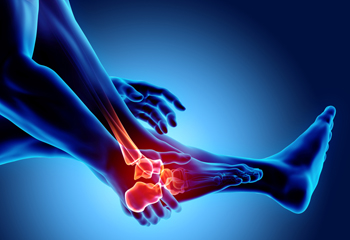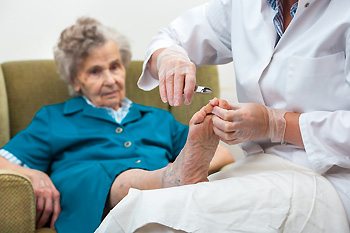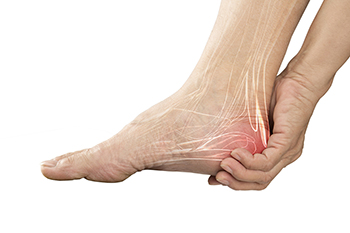Connect With Us
Blog
Items filtered by date: June 2022
Obesity and Foot Problems

Obesity is often linked to foot problems. Those who are overweight have a greater risk of wear and tear problems, such as arthritis, tendonitis, and heel pain. A mere one pound can increase pressure on hips, knees, and ankles by eight pounds. Type II diabetes is also often associated with obesity and this health condition can have serious effects on the feet. One with diabetes can develop numbness and loss of sensation in their extremities and this can prevent them from feeling pain in their feet. Sores and wounds can develop without them knowing it if they do not check their feet regularly. Weight control is essential to alleviating foot pain. If you are overweight and have foot pain or if you have diabetes, carefully monitor your food intake, do regular exercise, and consider consulting with a podiatrist who can help guide you in taking care of your feet.
The more you weigh, the harder your feet must work to support your body. If you’re an obese individual and are concerned about your feet, contact Bill Brown, DPM from Brown Podiatry. Our doctor can provide the care you need to keep you pain-free and on your feet.
Obesity and Your Feet
People who are overweight are putting more pressure on their ankles, knees, and hips as well as their feet. This unfortunately can lead to variety of different issues.
Problems & Complications Stemming from Obesity
- When the body is overweight, it tries to compensate by changing the way that it moves. An obese person may lean forward and put extra weight on the wrong part of the foot. This puts unnecessary stress on the feet.
- Obese people are also more likely to develop type II diabetes which is a condition that causes a lot of foot problems. People with diabetes often don’t feel the cuts and sores that they may have on their feet, which can lead to more complicated and severe issues.
- Plantar fasciitis is another foot condition that can be caused by obesity. Plantar fasciitis is an inflammation of the tissue along the bottom of the foot, which causes pain and stiffness while walking and climbing stairs.
If you have any questions, please feel free to contact our office located in Scranton, PA . We offer the newest diagnostic and treatment technologies for all your foot care needs.
Arthritis Can Affect the Feet, Toes, and Ankles

Arthritis can have painful effects on the feet, toes, and ankles. Some of the more common types of arthritis are described here. Osteoarthritis (OA) mainly affects the first metatarsal joint connecting the big toe to the foot, as well as the midfoot and ankle. It is a wear and tear arthritis because it causes cartilage in the joints to wear down, leading the bones to rub together. Rheumatoid arthritis (RA) is an autoimmune disease where the immune system attacks the lining of the joints, including the ankle, heels, midfoot, and forefoot. Over time, the damage can lead to joint deformity and/or disability. Gout is an inflammatory type of arthritis caused by uric acid build up and crystallization in joints, often in the big toe of the foot. Psoriatic arthritis (PsA) is also an inflammatory arthritis that can happen to those with psoriasis. It can affect the joints in the ankle as well as ligaments and tendons in the foot. Anyone with any type of arthritis can experience foot involvement, which can make it hard to walk and perform activities of daily life. While arthritis has no cure, treatment options exist to slow the progression of the disease and relieve symptoms. If you experience the pain of arthritis in your feet and ankles, seek the counsel of a podiatrist who can help you manage pain, stay active, and lead a fulfilling life.
Arthritis can be a difficult condition to live with. If you are seeking treatment, contact Bill Brown, DPM from Brown Podiatry. Our doctor can provide the care you need to keep you pain-free and on your feet.
Arthritic Foot Care
Arthritis is a joint disorder that involves the inflammation of different joints in your body, such as those in your feet. Arthritis is often caused by a degenerative joint disease and causes mild to severe pain in all affected areas. In addition to this, swelling and stiffness in the affected joints can also be a common symptom of arthritis.
In many cases, wearing ill-fitting shoes can worsen the effects and pain of arthritis. Wearing shoes that have a lower heel and extra room can help your feet feel more comfortable. In cases of rheumatoid arthritis, the arch in your foot may become problematic. Buying shoes with proper arch support that contour to your feet can help immensely.
Alleviating Arthritic Pain
- Exercises that stretch the foot can prevent further pain and injury and increase mobility
- Most of the pain can be alleviated with anti-inflammatory drugs, heat, and topical medications
- Massages can help temporarily alleviate pain.
It is best to see your doctor for the treatment that is right for your needs and symptoms. Conditions vary, and a podiatrist can help you determine the right method of care for your feet.
If you have any questions, please feel free to contact our office located in Scranton, PA . We offer the newest diagnostic tools and technology to treat your foot and ankle needs.
Foot Cramps in the Elderly

Foot cramps are a result of the foot muscles involuntarily contracting. They are inconvenient, uncomfortable, and even painful, but they are usually not serious. One may experience a foot cramp due to dehydration, muscle fatigue, or exercising without proper stretching of the calves and feet. They may also result from a side effect of a medication or a nutritional deficiency. With age, nerves and muscles may wear out and cramping can occur. Older people are also generally less active than younger people, therefore, they may have a higher risk for these muscle spasms. Furthermore, nocturnal foot cramps may be related to a circulation disorder, which is also more common among the elderly. Wearing well-fitting, supportive shoes can help as well as massaging the feet and using cool or warm compresses when a foot cramp occurs. If you suffer from severe or frequent muscle cramps in your feet, it is suggested you consult with a podiatrist who can help diagnose the cause and provide the proper treatment regime.
Proper foot care is something many older adults forget to consider. If you have any concerns about your feet and ankles, contact Bill Brown, DPM from Brown Podiatry. Our doctor can provide the care you need to keep you pain-free and on your feet.
The Elderly and Their Feet
As we age we start to notice many changes in our body, but the elder population may not notice them right away. Medical conditions may prevent the elderly to take notice of their foot health right away. Poor vision is a lead contributor to not taking action for the elderly.
Common Conditions
- Neuropathy – can reduce feeling in the feet and can hide many life-threatening medical conditions.
- Reduced flexibility – prevents the ability of proper toenail trimming, and foot cleaning. If left untreated, it may lead to further medical issues.
- Foot sores – amongst the older population can be serious before they are discovered. Some of the problematic conditions they may face are:
- Gouging toenails affecting nearby toe
- Shoes that don’t fit properly
- Pressure sores
- Loss of circulation in legs & feet
- Edema & swelling of feet and ankles
Susceptible Infections
Diabetes and poor circulation can cause general loss of sensitivity over the years, turning a simple cut into a serious issue.
If you have any questions please feel free to contact our office located in Scranton, PA . We offer the newest diagnostic and treatment technologies for all your foot and ankle needs.
See Your Podiatrist Regularly If You Work On Your Feet
What May Be Causing Your Heel Pain

If you are experiencing heel pain, chances are you may have plantar fasciitis, which is the most common cause. Plantar fasciitis occurs when there is an inflammation of the plantar fascia tissue on the bottom of the foot. This connective tissue attaches at the heel bone, then extends towards the forefoot, fanning out into five bands that attach to each toe’s phalanx bone. The plantar fascia supports the arch and helps to act as a shock absorber when walking, running, and jumping. Since the plantar fascia is used continuously in everyday activities it can become stressed, overused, and even torn. The heel pain of plantar fasciitis is usually at its most severe when you take your first steps after waking up or resting. It is suggested that you make an appointment with a podiatrist if you are experiencing any kind of heel pain. Podiatrists treat plantar fasciitis and other forms of heel pain every day and have many therapies and methods of treatment that will offer you the relief you seek.
Plantar fasciitis can be very painful and inconvenient. If you are experiencing heel pain or symptoms of plantar fasciitis, contact Bill Brown, DPM from Brown Podiatry. Our doctor can provide the care you need to keep you pain-free and on your feet.
What Is Plantar Fasciitis?
Plantar fasciitis is the inflammation of the thick band of tissue that runs along the bottom of your foot, known as the plantar fascia, and causes mild to severe heel pain.
What Causes Plantar Fasciitis?
- Excessive running
- Non-supportive shoes
- Overpronation
- Repeated stretching and tearing of the plantar fascia
How Can It Be Treated?
- Conservative measures – anti-inflammatories, ice packs, stretching exercises, physical therapy, orthotic devices
- Shockwave therapy – sound waves are sent to the affected area to facilitate healing and are usually used for chronic cases of plantar fasciitis
- Surgery – usually only used as a last resort when all else fails. The plantar fascia can be surgically detached from the heel
While very treatable, plantar fasciitis is definitely not something that should be ignored. Especially in severe cases, speaking to your doctor right away is highly recommended to avoid complications and severe heel pain. Your podiatrist can work with you to provide the appropriate treatment options tailored to your condition.
If you have any questions please feel free to contact our office located in Scranton, PA . We offer the newest diagnostic and treatment technologies for all your foot and ankle needs.

